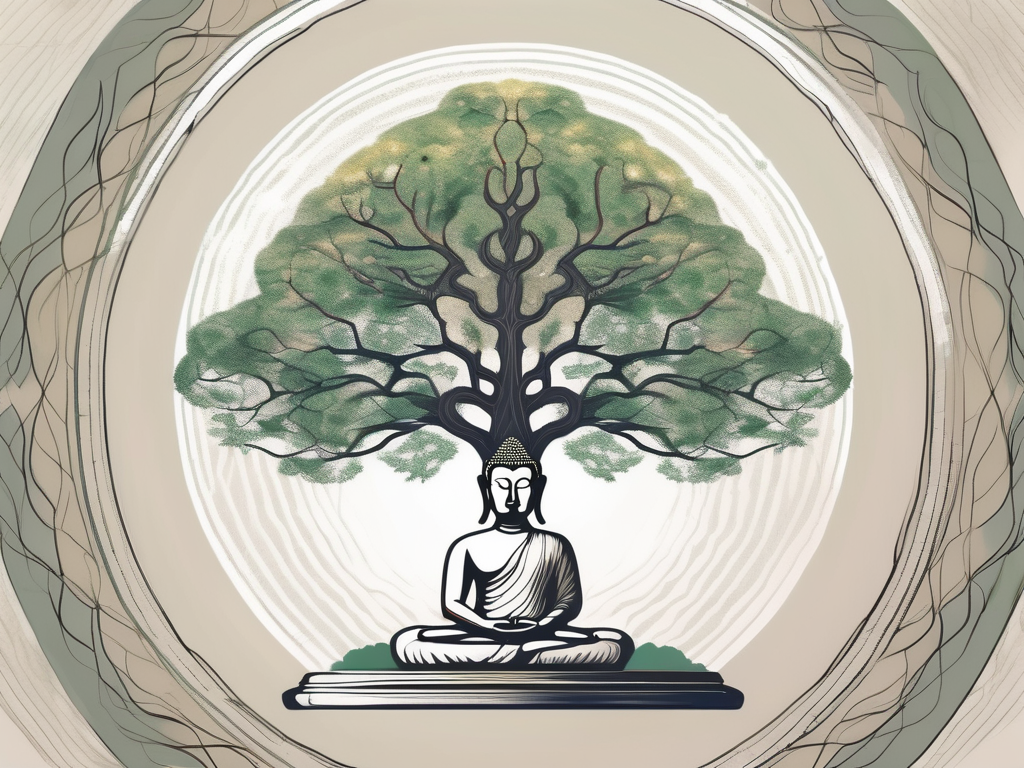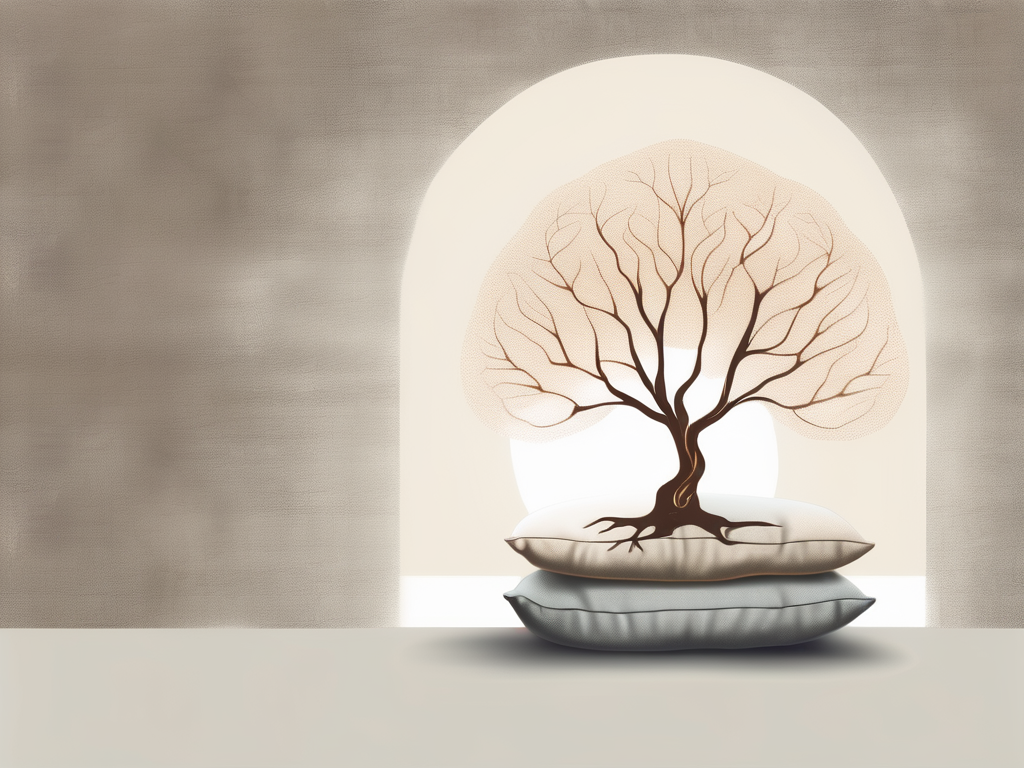Siddhartha Gautama, commonly known as the Buddha, is the founding figure of Buddhism. His teachings have had a profound impact on millions of people around the world. In this article, we will delve into the beliefs of Siddhartha Gautama and explore their relevance in today’s world.
Understanding Siddhartha Gautama: The Man Behind Buddhism
Siddhartha Gautama was born in ancient India around the 6th century BCE. He spent his early life in luxury, shielded from the harsh realities of the world. However, at the age of 29, Siddhartha made a decision that would change the course of his life and eventually lead to the development of Buddhism.
Early Life and Influences of Siddhartha Gautama
Siddhartha was raised in a palace as a prince, but he became increasingly aware of the suffering that existed outside its walls. This realization sparked his curiosity and motivated him to seek a deeper understanding of life. He embarked on a spiritual journey, seeking guidance from various religious teachers and engaging in intense meditation practices.
During his quest for knowledge, Siddhartha encountered different philosophies and religious traditions prevalent in ancient India. He studied the teachings of Hinduism, Jainism, and other spiritual paths, immersing himself in the rich tapestry of Indian spirituality. Each encounter left an indelible mark on his evolving worldview, shaping his unique perspective on existence and the nature of suffering.
As Siddhartha delved deeper into his spiritual exploration, he engaged in rigorous ascetic practices. He subjected himself to extreme physical hardships, fasting for extended periods and enduring severe self-mortification. These austere practices were part of his relentless pursuit of truth and enlightenment.
The Great Renunciation: Siddhartha’s Quest for Enlightenment
Despite his luxurious upbringing, Siddhartha renounced his princely status, leaving behind his family, wealth, and all worldly attachments. He embarked on a quest for spiritual enlightenment, driven by a desire to find a solution to the universal problem of suffering.
Leaving the comforts of his palace, Siddhartha wandered as a homeless ascetic, seeking answers to life’s profound questions. He lived a life of simplicity, relying on alms for sustenance and embracing a minimalist existence. This deliberate renunciation of material possessions allowed him to focus solely on his spiritual journey.
During his wanderings, Siddhartha engaged in deep meditation, spending hours in silent contemplation under the Bodhi tree. It was here, in the serene solitude of nature, that he experienced a profound awakening. Siddhartha Gautama became the Buddha, the enlightened one, as he gained deep insights into the nature of suffering and the path to liberation.
The Buddha’s teachings, known as the Dharma, emphasized the Four Noble Truths and the Eightfold Path as the means to attain liberation from suffering. His teachings resonated with people from all walks of life, transcending social barriers and offering a path to inner peace and enlightenment.
Throughout his life, the Buddha traveled extensively, sharing his teachings with diverse audiences. He established a monastic community, known as the Sangha, to preserve and propagate his teachings. The Buddha’s profound wisdom and compassionate teachings continue to inspire millions of people around the world, making him one of the most influential figures in human history.
Core Beliefs of Siddhartha Gautama
Central to Siddhartha Gautama’s teachings are the Four Noble Truths. These truths serve as the foundation of Buddhist philosophy and provide a roadmap for understanding the nature of suffering and a path towards liberation.
Siddhartha Gautama, also known as the Buddha, dedicated his life to finding answers to the fundamental questions of existence. Through his own personal journey and deep contemplation, he arrived at these profound truths that continue to guide millions of people around the world.
The first Noble Truth acknowledges that suffering exists and is an integral part of human life. Life is filled with various forms of suffering, such as physical pain, emotional turmoil, and the inevitable experience of loss. The Buddha recognized that suffering is an inherent aspect of existence, and by acknowledging its presence, individuals can begin to explore ways to alleviate it.
The second Truth examines the causes of suffering, identifying craving and attachment as the root causes. The Buddha observed that human beings have a tendency to cling to desires and attach themselves to transient things. This attachment leads to suffering, as it creates a perpetual cycle of longing and disappointment. By recognizing this truth, individuals can cultivate a sense of detachment and find freedom from the chains of craving.
The third Truth offers hope by suggesting that there is a way to overcome suffering. The Buddha taught that liberation from suffering is possible, and it lies within the reach of every individual. By understanding the causes of suffering and making conscious choices, one can embark on a transformative journey towards liberation.
Finally, the fourth Truth outlines the Eightfold Path as a means to achieve liberation from suffering. The Eightfold Path is a comprehensive guide that encompasses ethical conduct, mental cultivation, and wisdom. It provides a roadmap for individuals to follow in order to attain enlightenment and break free from the cycle of rebirth.
The Eightfold Path
The Eightfold Path is a set of guidelines that Buddhists follow to attain enlightenment. It is a holistic approach that encompasses various aspects of life, including thoughts, speech, and actions.
Right Understanding is the foundation of the Eightfold Path. It involves gaining a deep insight into the nature of reality and understanding the interconnectedness of all things. Right Intention emphasizes the importance of cultivating wholesome intentions and letting go of harmful desires.
Right Speech encourages individuals to communicate with honesty, kindness, and mindfulness. It emphasizes the power of words and the impact they can have on others. Right Action guides individuals to act in ways that are ethical and compassionate, avoiding harm to oneself and others.
Right Livelihood encourages individuals to engage in occupations that promote well-being and do not cause harm to others. It emphasizes the importance of work that aligns with one’s values and contributes positively to society.
Right Effort emphasizes the importance of cultivating wholesome qualities and letting go of unwholesome ones. It encourages individuals to persevere in their spiritual practice and develop positive habits.
Right Mindfulness is the practice of being fully present and aware of one’s thoughts, feelings, and sensations. It involves observing the mind without judgment and cultivating a sense of non-reactivity.
Right Concentration is the practice of developing focused and tranquil states of mind through meditation. It involves training the mind to become calm, collected, and free from distractions.
The Concept of Nirvana
Nirvana, the ultimate goal of Buddhism, is a state of liberation from suffering and the cycle of rebirth. It is a state of profound peace, wisdom, and contentment that transcends the limitations of ordinary existence.
Attaining Nirvana requires a deep understanding of the Four Noble Truths and diligent practice of the Eightfold Path. It is not a destination that can be reached through external means, but rather an internal transformation that occurs through personal insight and realization.
Nirvana is often described as the extinguishing of the fires of craving, attachment, and ignorance. It is the cessation of suffering and the realization of one’s true nature. In this state, individuals experience a profound sense of interconnectedness with all beings and a deep sense of inner peace.
While the concept of Nirvana may seem abstract and elusive, it serves as a guiding light for Buddhists on their spiritual journey. It reminds them of the ultimate goal and encourages them to cultivate the qualities and practices that lead to liberation.
The Impact of Siddhartha Gautama’s Beliefs
Siddhartha Gautama’s teachings spread across ancient India and gradually extended to other parts of the world. Buddhism’s influence can be seen not only in religious practices but also in philosophy and ethics.
Siddhartha Gautama, also known as the Buddha, was a spiritual leader who lived in ancient India during the 5th century BCE. His teachings, which emphasized the path to enlightenment and the alleviation of suffering, attracted a following of disciples who continued his teachings after his death. These disciples, also known as monks and nuns, played a crucial role in the dissemination of Buddhism. They traveled far and wide, spreading the Buddha’s teachings to different regions and cultures.
One of the key factors that contributed to the spread of Buddhism was its adaptability. As it reached different regions, Buddhism incorporated local beliefs and customs, resulting in the development of various schools of thought. For example, in East Asia, Buddhism merged with Confucianism and Taoism, creating a unique blend of religious and philosophical practices.
The Spread of Buddhism
During his lifetime, Siddhartha Gautama attracted a following of disciples who continued his teachings after his death. These disciples, also known as monks and nuns, played a crucial role in the dissemination of Buddhism. Over time, Buddhism spread to various regions, adapting to different cultures and evolving into different schools of thought.
As Buddhism spread, it encountered diverse cultural practices and beliefs. In Southeast Asia, for instance, Buddhism blended with animism, resulting in the incorporation of nature spirits and ancestral worship into Buddhist rituals. In Tibet, Buddhism merged with the indigenous Bon religion, giving rise to a unique form of Tibetan Buddhism.
Buddhism’s spread was not limited to Asia alone. In the 19th and 20th centuries, Buddhist missionaries and scholars brought the teachings of the Buddha to the West. This led to the establishment of Buddhist communities and the integration of Buddhist ideas into Western philosophy and psychology.
Buddhism’s Influence on Philosophy and Ethics
Buddhism’s emphasis on compassion, mindfulness, and interconnectedness has had a significant impact on philosophy and ethics. Buddhist principles, such as non-harming and the practice of loving-kindness, have influenced various philosophical and ethical systems throughout history.
In the field of philosophy, Buddhism’s teachings on the nature of reality and the self have sparked debates and discussions. Buddhist concepts such as impermanence, emptiness, and dependent origination have challenged traditional philosophical notions and offered alternative perspectives on the nature of existence.
Furthermore, Buddhism’s ethical teachings have had a profound influence on how individuals and societies approach moral dilemmas. The concept of karma, for example, has shaped the understanding of cause and effect, emphasizing personal responsibility and the consequences of one’s actions. Buddhist ethical principles, such as the Five Precepts, which include refraining from killing, stealing, and lying, have been integrated into various ethical frameworks and have guided individuals in leading more compassionate and mindful lives.
Moreover, Buddhism’s focus on mindfulness and meditation has gained recognition in the field of psychology. The practice of mindfulness, which involves paying attention to the present moment without judgment, has been incorporated into various therapeutic approaches and has shown promising results in reducing stress, anxiety, and depression.
In conclusion, Siddhartha Gautama’s beliefs and teachings have had a far-reaching impact on the world. Buddhism’s spread across different regions and its influence on philosophy, ethics, and psychology have shaped the way people think, act, and perceive the world around them.
Misconceptions About Siddhartha Gautama’s Beliefs
Despite the widespread popularity of Buddhism, there are still some misconceptions surrounding Siddhartha Gautama’s beliefs that need addressing.
Buddhism as a Religion vs. Philosophy
Some people perceive Buddhism solely as a religion, while others view it purely as a philosophy. In reality, Buddhism encompasses elements of both. It offers guidance for religious practices, such as rituals and meditation, while also providing philosophical insights into the nature of existence.
The Role of Gods and Deities in Buddhism
Contrary to popular belief, Buddhism does not focus on the worship of gods or deities. Instead, it encourages individuals to take responsibility for their own lives and cultivate their own spiritual development through personal practice.
Siddhartha Gautama’s Beliefs in Today’s World
Siddhartha Gautama’s teachings continue to have relevance in the modern world, as individuals seek meaning, purpose, and peace in their lives.
Modern Interpretations of Gautama’s Teachings
Many contemporary scholars and spiritual leaders have offered fresh interpretations of Siddhartha Gautama’s teachings, making them accessible to people from various cultural backgrounds. These interpretations emphasize the practical application of Buddhist principles in daily life, fostering personal growth and well-being.
Buddhism in the 21st Century
In the 21st century, Buddhism has expanded its reach with the aid of technology and globalization. Meditation practices, mindfulness techniques, and the teachings of Siddhartha Gautama have gained popularity in various parts of the world, helping individuals find balance and inner peace amidst the fast-paced modern lifestyle.
Conclusion
In conclusion, Siddhartha Gautama believed in the inherent existence of suffering and offered a path towards liberation through his teachings. The Four Noble Truths, the Eightfold Path, and the concept of Nirvana form the core of his beliefs. Siddhartha’s profound insights continue to inspire and guide individuals on their spiritual journeys, offering solace and wisdom in our complex world.












